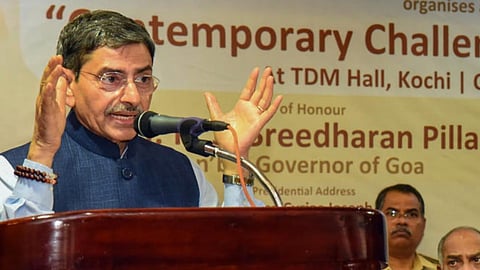

In the backdrop of World Day of Social Justice, which was observed earlier this week, it makes sense to take stock of how India as a nation has strived to uphold the principles of equity within the complex social fabric of its democracy. Recently, Governor RN Ravi highlighted Tamil Nadu’s poor track record in preventing atrocities against Dalits. He referred to a shameful incident that transpired just last month, when the overhead water tank of a Dalit colony in Vengaivayal, Pudukkottai was contaminated after human excreta was dumped into it. The incident came to light when several children in the village started falling ill after consuming the contaminated water. The incident caught the attention of Chief Minister MK Stalin who said caste discrimination and untouchability still exists in pockets of our society.
The aforementioned incident is not an isolated one. Last December, many instances of atrocities against Dalits were reported in the State. On one occasion, a few members of the OBC community denied entry to Dalits in the Sakthi Mariamman temple in Salem. In another incident, the kin of a 102-year-old deceased woman were barred from burying her in a common burial ground in Coimbatore. A school head mistress in Erode was also taken to task for ordering scheduled castes students to clean a school lavatory. Similarly, a barber who owned a salon in Thanjavur was arrested for denying service to men belonging to the scheduled castes.
It is worth noting that in such regions in Tamil Nadu, where caste discrimination is rampant, there are tea shops and eateries that follow a two-tumbler system. The privileged caste members are served in one tumbler while members of the underserved communities are permitted to use another tumbler ‘reserved’ for them. And such discrimination starts at an early age where even children in anganwadis are separated based on caste-lines. For the privileged lot living in the metros of India, these developments might sound like machinations of a medieval society. But these are the realities of a modern, growth-oriented nation like India, where 90% of the population is still considered socially backward.
As per the Comptroller and Auditor General of India’s report, as much as 30% of central allocation aimed at building homes for members of the Dalit community remains unspent. To top it off, just about 7% of rape cases filed by Dalit women end in conviction. Observers in the policy space remark that the privileged classes in India, who comprise under 3% of the country’s population, continue to exercise dominance in the legislative, administrative, and judicial systems. The under-representation of backward communities in the higher echelons of nation building is one of the reasons why generations of such families remain stuck in a cycle of poverty and illiteracy, at the bottom of the socioeconomic pyramid.
One could argue that the ascension of a Dalit woman as the President of the country might be a harbinger of things to come. However, there is so much more to be achieved in the space of social justice legislation and enforcement than mere tokenism. Situational awareness needs to be created among youngsters and adults of this nation that places the question of equity front and centre. And for that, it might be necessary for many of us to alight from the high horse of privilege and engage with society, sans hang-ups.
Visit news.dtnext.in to explore our interactive epaper!
Download the DT Next app for more exciting features!
Click here for iOS
Click here for Android